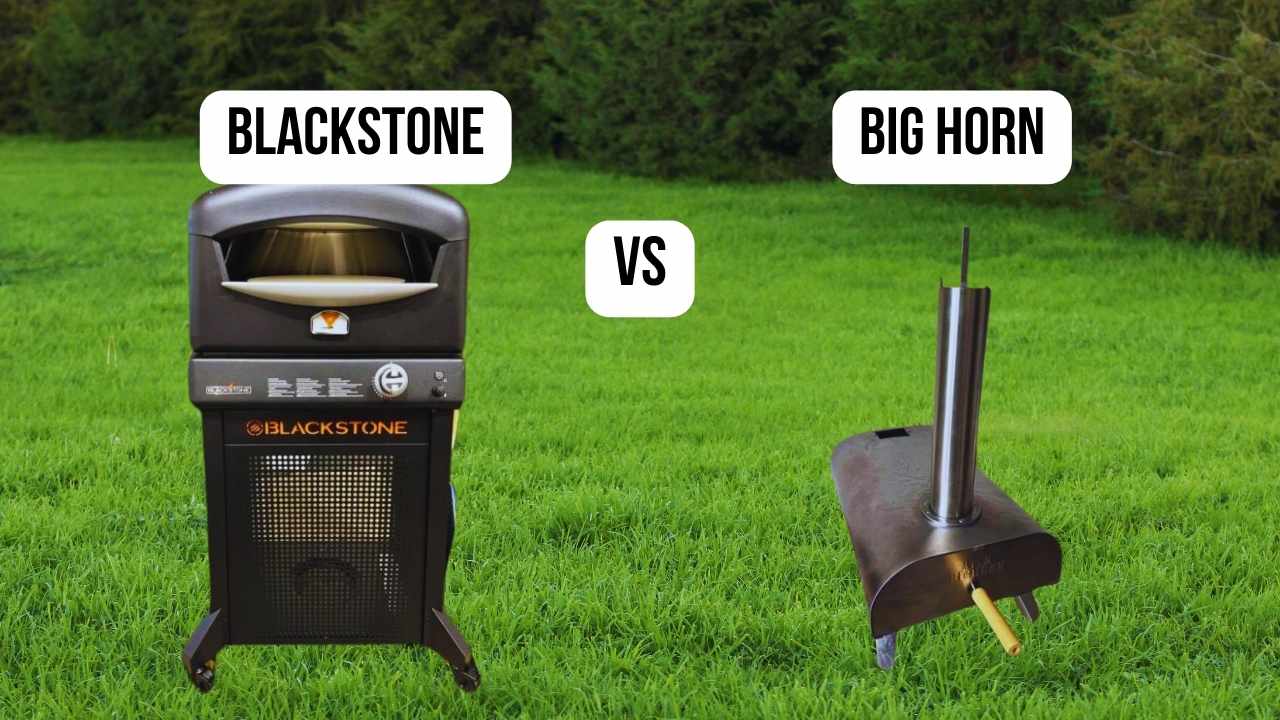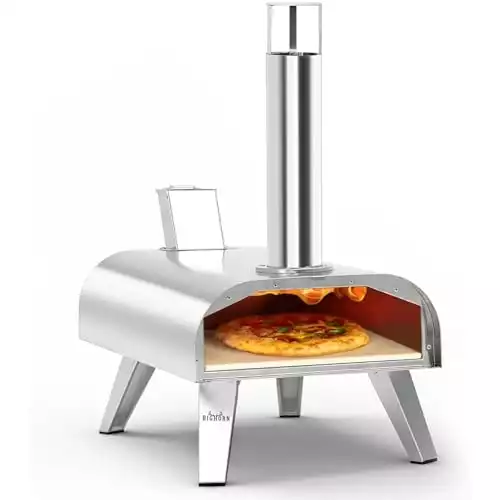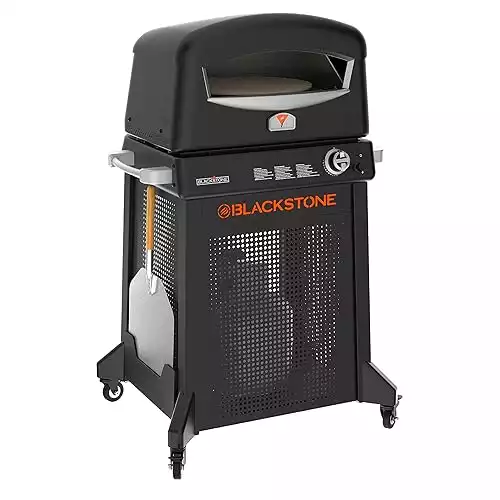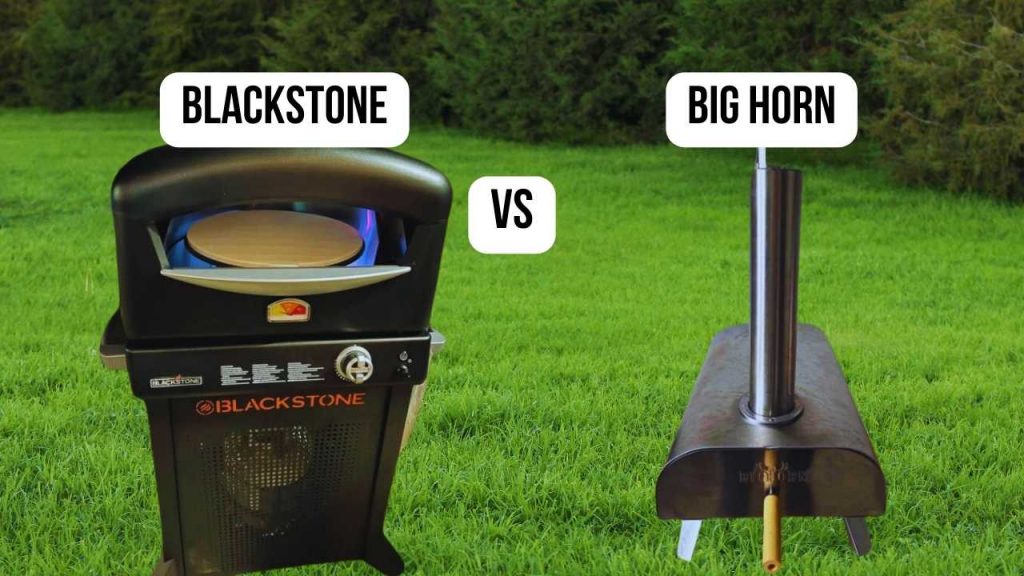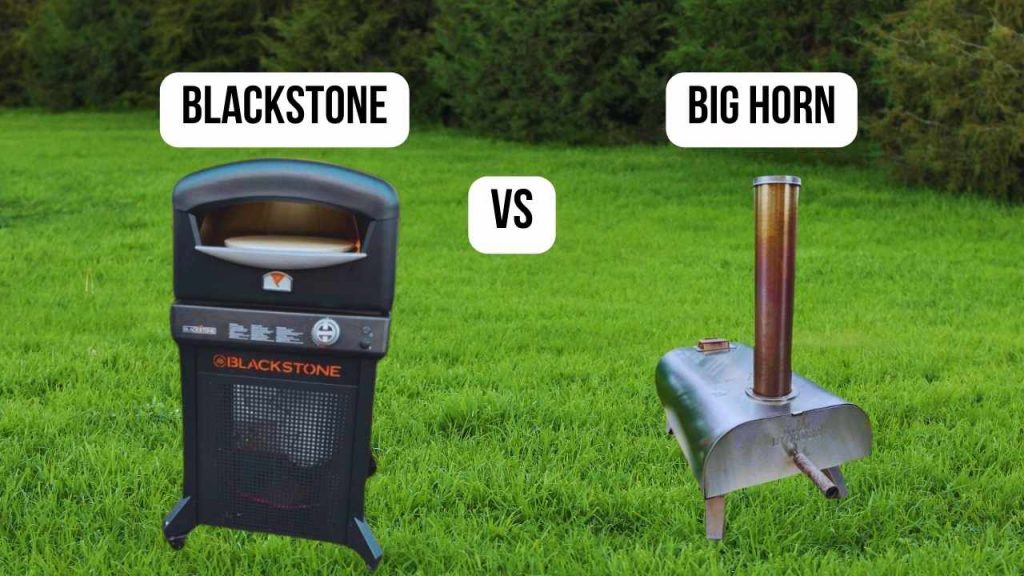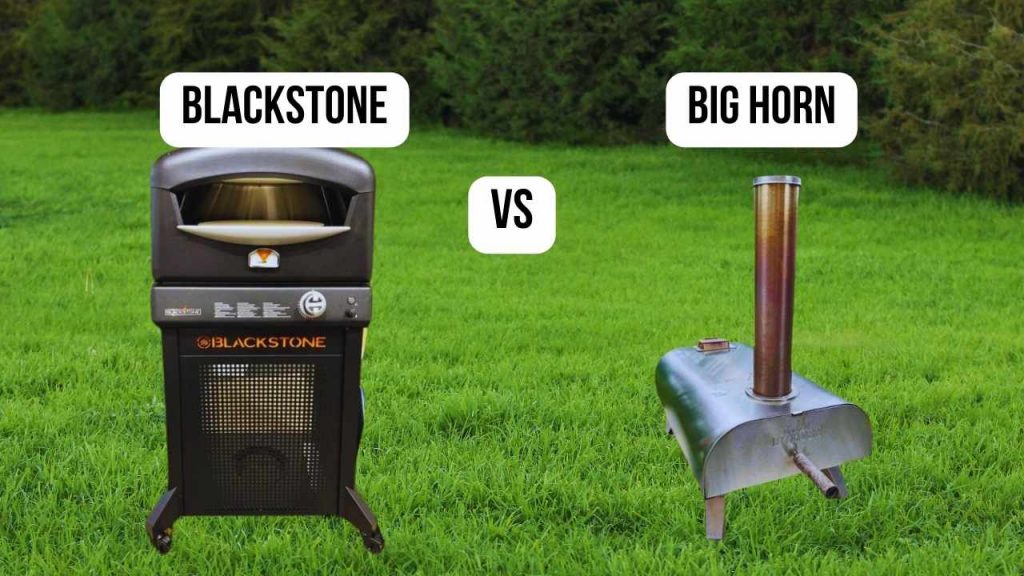As a restaurant chef with over 10 years of experience at my restaurant, Dequte Restaurant LironBoylston, I’ve worked with numerous pizza ovens to achieve the perfect crust and flavor. Today, I’ll compare the Big Horn Pizza Oven and the Blackstone Pizza Oven, both of which I’ve extensively tested in my kitchen. My analysis covers key aspects such as quality and materials, temperature control, shape, first-time usage impressions, power source, size, ease of cleaning, and a real pizza cooking test to see how they perform. For more details on my testing process, you can check my separate article.
- The Big Horn Pizza Oven is an affordable, compact wood pellet oven designed for outdoor enthusiasts who value portability and smoky flavor.
- The Blackstone Pizza Oven is a versatile gas-powered oven known for its innovative rotating stone, delivering evenly cooked pizzas with ease.
Here, I’ve done an in-depth comparison of the Big Horn Pizza Oven and the Blackstone Pizza Oven, backed by my test results.
The Big Horn Pizza Oven claimed its spot in the TOP-5 pizza ovens.
|
Our Rating:
4.8
|
Our Rating:
4.5
|
|
Pros:
|
Pros:
|
|
Cons:
|
Cons:
|
- Decent stainless steel build with a silicone door seal
- Heats up to around 500-550°F in 15-16 minutes
- Dome shape that promotes airflow
- Lighter and more compact
- Relies solely on wood pellets
- Cleaning requires more effort, especially with removing ash from the wood pellets
- Durable construction with a stainless-steel cooking chamber and a heavy-Duty cast iron rotating tray
- Capable of reaching 900°F
- Unique design
- Heavier and bulkier
- Took longer to assemble
- Powered by a single, high-pressure propane burner
- Requires more effort to clean
Disclaimer: This article contains referral links that help support my blog at no extra cost to you. If you decide to purchase one of these ovens, I’ll earn a small commission, which allows me to continue sharing detailed reviews. Thank you for your support!
Big Horn VS Blackstone: Quality and Materials
| The Big Horn Pizza Oven features a lightweight stainless steel build with a silicone door seal for durability. The cordierite pizza stone ensures even heat distribution and crisp crusts, but some users note minor challenges with heat retention. |
The Blackstone Pizza Oven has a sturdy stainless steel cooking chamber, a cast iron rotating tray base for even cooking, and double-wall insulation for consistent heat. However, its heavier build and bulky design may not suit every user.
|
Big Horn VS Blackstone: Temperature Control
| The Big Horn Pizza Oven heats quickly to 500–550°F in about 15–16 minutes. While temperature control requires some finesse, it excels at delivering consistent heat for a smoky-flavored pizza experience. |
The Blackstone Pizza Oven reaches temperatures over 900°F in about 10 minutes, thanks to its powerful 60,000 BTU propane burner. However, its unique burner placement can sometimes result in uneven cooking.
|
Big Horn VS Blackstone: Shape
| The round, dome-shaped design of the Big Horn Pizza Oven promotes even heat circulation and a crisp, uniform pizza crust. |
The Blackstone Pizza Oven features a unique design with the burner placed away from the stone, reducing direct flame contact but potentially leading to uneven heating in certain conditions.
|
Big Horn VS Blackstone: First-Time Usage Impressions
| The Big Horn Pizza Oven is easy to set up, lightweight, and portable. First-time use highlighted its straightforward design and the flavorful smoky taste it imparts to pizzas. |
The Blackstone Pizza Oven offers a robust build but requires assembly with two people. Lighting the burner can be challenging for first-time users, and handling its high heat requires extra care.
|
Big Horn VS Blackstone: Power Source
| The Big Horn Pizza Oven uses wood pellets as its primary fuel, delivering a traditional wood-fired flavor. It also supports charcoal or other types of pellets for versatility. |
The Blackstone Pizza Oven is powered by a high-pressure propane burner, providing consistent and strong heat for quick cooking but lacks the flavor versatility of wood-fired options.
|
Big Horn VS Blackstone: Size
| Compact and portable, the Big Horn Pizza Oven can comfortably fit a 12-inch pizza and is ideal for outdoor gatherings. Its small footprint makes it easy to transport and store. |
The Blackstone Pizza Oven is significantly larger and heavier, making it better suited for stationary use in backyards or patios. Its size accommodates a 16-inch pizza but requires ample space.
|
Big Horn VS Blackstone: Ease of Cleaning
| The Big Horn Pizza Oven is user-friendly when it comes to cleaning. Removable parts, like the fire tray and grill, make cleanup straightforward. However, caution is needed due to sharp internal edges. |
The Blackstone Pizza Oven offers easy cleaning with a removable pizza stone and accessible interior, but its larger size makes maintenance more time-consuming.
|
Pizza Cooking Test
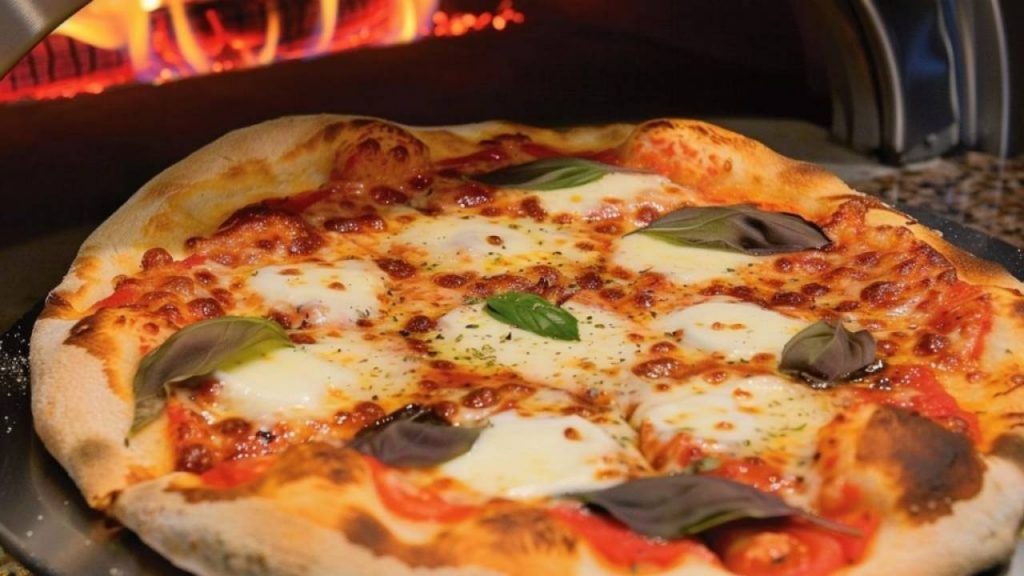
The Big Horn Pizza Oven and the Blackstone Pizza Oven both showcased their strengths during the pizza cooking test, with some notable differences in performance.
The Big Horn reached its optimal cooking temperature of 500–550°F in approximately 15–16 minutes. This steady preheating process ensured a well-balanced cooking environment. When cooking a Margherita pizza, it only took 1.5 minutes to achieve a crispy, golden-brown crust and perfectly melted cheese. The smoky flavor imparted by the wood pellets added a traditional touch to the pizza, enhancing its overall taste and authenticity. The Big Horn excelled in creating an artisan-style pizza that resonated with classic wood-fired charm.
The Blackstone preheated more rapidly, reaching over 900°F in just 10 minutes, thanks to its powerful propane burner. The Margherita pizza was cooked in a swift 70 seconds. The crust turned out crispy, and the bottom was beautifully seared. However, due to its burner design, the toppings didn’t cook as evenly as desired, requiring some manual adjustment during cooking. Despite this, the pizza’s flavor was vibrant and satisfying, though lacking the smoky nuance of a wood-fired oven.
The Big Horn Pizza Oven delivered a traditional wood-fired flavor that stood out, while the Blackstone Pizza Oven offered excellent speed and a crisp base but required extra care to achieve balanced cooking. Both ovens produced high-quality pizzas, with the Big Horn emphasizing flavor authenticity and the Blackstone excelling in speed.
How We Tested

To evaluate the performance of both the Big Horn Pizza Oven and the Blackstone Pizza Oven, we conducted a series of cooking tests under controlled conditions. We aimed to assess preheating times, cooking efficiency, and the final quality of a classic Margherita pizza.
First, each oven was set up in an outdoor space with proper ventilation, adhering to the manufacturer’s guidelines. We used wood pellets for the Big Horn and propane for the Blackstone to align with their respective power sources. Both ovens were preheated to their optimal temperatures, monitored using an infrared thermometer to ensure accuracy.
For the cooking test, we prepared identical Margherita pizzas, using the same dough, sauce, cheese, and toppings. Each pizza was launched into its respective oven once the stone reached the desired temperature. We rotated the pizzas during cooking to ensure even exposure to heat, noting any challenges such as hot spots or uneven browning.
The Big Horn pizza oven took slightly longer to preheat but excelled in delivering a smoky, authentic wood-fired flavor. Meanwhile, the Blackstone heated quickly and cooked pizzas at impressive speeds, though achieving even results required some additional effort.
By focusing on consistency, flavor, and ease of use, we ensured a fair and comprehensive comparison between the two ovens.

